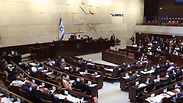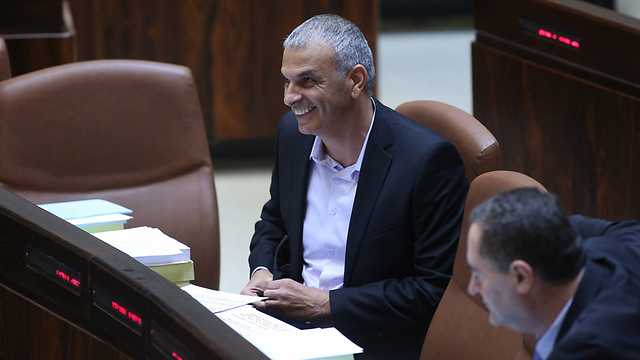
The Knesset
צילום: גיל יוחנן
Israeli lawmakers approve nearly NIS 1 trillion 2017-18 budget
Voting 60-48, the Israeli government has approved a NIS 1 trillion budget; the budget, which is for the next two years, has been praised by Finance Minister Kahlon, Prime Minister Netanyahu.
Israel's parliament early on Thursday gave final approval to the 2017-2018 state budget that the Finance Ministry says will reduce the cost of living, tackle a housing crisis, and boost economic growth and productivity.
Lawmakers voted 60-48 in favour of the nearly 1 trillion shekel ($261 billion) spending package and economic plan, which followed approval in parliament's finance committee on Tuesday.
"The budget is a social one," said Finance Minister Kahlon, "a budget that helps the entire population. It reduces social gaps, increases public spending, cuts taxes and ... emphasises social ministries."
Kahlon has said his policies -- which include levying a tax on those who own at least three apartments -- would rein in housing prices that have more than doubled since 2007 to put home ownership out of reach of many younger Israelis.
Passage of the budget was not in doubt since the six-party coalition of Prime Minister Benjamin Netanyahu holds 67 of parliament's 120 seats.
Netanyahu fought hard for a two-year budget as a means of stabilising his coalition despite many calls in the government to stick to a yearly budget since it is difficult to project what will happen to the economy two years out.
The two-year package includes safeguards that will allow the 2018 budget to be reassessed next year if initial economic and fiscal forecasts are missed, with a provision for spending cuts if necessary to reach the deficit target.
Israel's economy is expected to grow nearly 3 percent in 2016 and as much as 3.5 percent in 2017, while the jobless rate is very low at 4.5 percent.
Israel's corporate tax rate, currently 25 percent, will fall to 24 percent in 2017 and to 23 percent in 2018.
The total base budget stands at 906.8 billion shekels - 446.8 billion shekels for 2017 and 460 billion for 2018.
The largest single expense is defence, at more than 70 billion shekels each year.
Various additions, if revenue proves higher than projected, could bring the total budget in the next two years to 994 billion shekels.
The Finance Ministry has set a budget deficit target of 2.9 percent of GDP for both 2017 and 2018, up from initial targets of 2.5 and 2.25 percent, respectively. This has angered the central bank, which wants the government to rein in spending.











